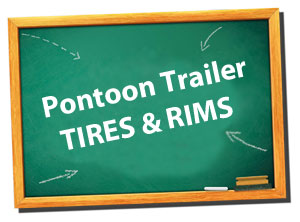 HOME |
|||||
Pontoon Trailer Tires and Rims |
|||||
| Tires on pontoon trailers are the weakest link in the product. You should assume that the tires on your new pontoon trailer are junk if the seller doesn’t specifically say something about them. I know that’s a strong accusation, but in 35 years of towing I’ve destroyed a lot of tires. Pontoon trailer tires are almost all imported. There is little standardization and your only clue is the load range rating. It’s stamped on the side of the tire. The higher the letter the more rubber in the tire. C is better than B, D is better than C, etc. I state else where that many pontoon trailers are sold as storage trailers and that some manufacturers, distributors, and dealers knowingly skimp on tires. They assume you’re not going to tow so cheap tires will “do”. In a year when they crack and weather you might not notice and no tire company warranty covers weathering. Since I mentioned the word warranty, I should admit that despite ruining 20+ tires in a lifetime, I have never received a warranty. The tire was either underinflated, overinflated, had a road hazard, or the entire tread blew off so that no blame could be fixed. In defense of the tire companies, I didn’t check for warranty after the first few problems. It’s always the owners fault. Reputable dealers will sometimes give you new tires if you have trouble within a few months, but they seldom get reimbursed from the tire companies. | |||||
 13”, 12”, and 10” pontoon trailer tires are shown to the right. The larger the tire, the fewer rotations. Bigger tires run cooler and often have a higher carrying capacity than smaller tires. Cooler running tires with higher capacity is what you want. The most important consideration is the size of the pontoon trailer tires. Some companies package their pontoon trailers with fat 10” (snowmobile tires). They are good on sand and help their trailer ride a couple inches lower. If you use your trailer in sand that may be a benefit but the reason the 10” wide tread tire is called a snowmobile tire is because it’s great on trailers in snow. |
|||||
| Heat build up is seldom an issue in the colder winter months. If you tow in the summer, heat is the enemy of your tires.The main thing you want from your tires is carrying capacity and cool running in hot weather. 12” run cooler than 10”, 13” run cooler than 12”, etc. When we drive to Florida I usually see five or six boat trailers on the side of the road between Valdosta and Ft Myers Beach. The trailers are not set up for hot weather running. It’s eight hours from Valdosta, GA. to south Florida and it’s usually 90 degrees or more. Almost everyone that’s broken down has a license plate from Indiana, Michigan, or Ohio. In all their years of towing they never traveled eight hours in hot weather and didn’t even think about their tires before they headed south. | |||||
 |
|||||
 |
 |
||||
| A Triple axle trailer with 14" tires. | A Triple axle trailer with 10" tires. | ||||
| Both of these big heavy duty trailers have a tire load carrying capacity over 8000 lb. Which tires do you think would run cooler and handle the road smoother under a heavy load? Because of the trailer design the trailer with 10” tires rides at about the same height as the trailer with 14” tires. Compare the frame to the position of the tires. Why would the manufacturer of the trailer on the right put 10” tires on a trailer for a big heavy boat? The simple answer is because that’s what they use on all their trailers. Be it the small lightweight ones or big heavy duty ones. They don’t generally stock larger tires, so you don’t have a choice. I also fault the marine dealers who sell a trailer like this. They wouldn’t sell a 4000 lb. fiberglass or ski boat on a trailer with 10” tires, but somehow it’s okay on a pontoon trailer. It’s the same thing that I’ve harped and harped about through this web site. No one believes you will ever tow, so tires aren’t important. | |||||
 |
|||||
| These little cracks are called weathering. The rubber in the tire “dries out” and cracks appear in the side wall. It’s a characteristic of bias ply tires. Generally speaking radials don’t weather like this. The tire companies usually claim that its a cosmetic “thing” and doesn’t affect performance. | |||||
| RADIAL TIRES | |||||
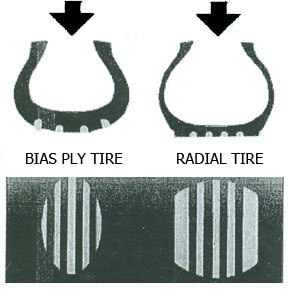 On
radial tires the sidewalls
and tread are independent.
Sidewall flexing is not
transmitted to the tread. It
provides: On
radial tires the sidewalls
and tread are independent.
Sidewall flexing is not
transmitted to the tread. It
provides: * A flat, stable, and wider footprint on the ground. * Less distortion of the contact point surface. * Better pressure distribution and reduced friction on the ground. * Longer tire life. * Excellent traction. * Improved handling and fuel economy. * More resistance to cuts, punctures, and tears. * Radials do not experience weathering on the sidewalls. |
|||||
|
The automobile companies
haven’t used bias ply tires
in 20+ years. When you buy a
new car would you agree to
take it with bias ply tires
if you could save $10 per
tire, even on a car that you
weren’t going to drive very
much? We have a generation
of people who have never
checked the air in tires and
who don’t know what
weathering on the side wall
of a bias ply tire is. Bias
ply tires can lose air
depending upon changes in
the weather. The side walls
of six month old bias ply
tires can start to weather.
Considering that trailer
tires are imported and can
sit in a distributors
warehouse for a year or
more, its not uncommon to
find tires on new trailers
starting to crack. If a new
pontoon trailer with bias
ply tires has sat on a
dealers lot during the
winter, there may be visible
cracks in the sidewall and
its a good bet the tires
will have lost air. If you
buy a pontoon trailer in the
winter or early spring,
insist that the seller check
the air in the tires. When you purchase a trailer, new or used, get down and look at the carrying capacity and the condition of the side walls of the tires. You may be surprised at what you see and better to see trouble before you get on the highway than to discover it when the tire fails. |
|||||
| Here’s what you need to know about radial tires on pontoon trailers. | |||||
|
IF you’re
towing and actually
traveling YOU WANT
RADIAL TIRES,
for all the reasons listed
above. IF your trailer is for storage and you’re not traveling much, YOU WANT RADIAL TIRES so that the tires that aren’t being used won’t weather and crack during storage. It’s just that simple. |
|||||
| RIMS | |||||
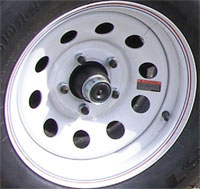 |
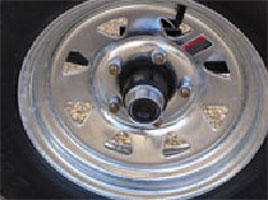 |
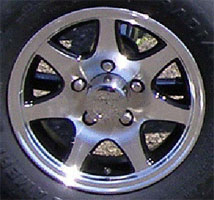 |
|||
| White Powdercoated Rim | Galvanized Rim | Aluminum Rim | |||
| Most pontoon trailers come with white painted (powder coated) rims. It’s a standard trailer part and everyone uses basically the same rim. The paint is generally good but after a few years rust will appear around the lug nuts. Galvanized rims usually cost just a few dollars more per rim (about $10) and generally won’t rust around the holes. An additional benefit of galvanized rims is that they look sharp (often almost like chrome) for a few years. Aluminum wheels are more expensive but give your trailer a custom look. | |||||
 |
|||||
| If you want to dress up your trailer, a little aluminum tread plate and aluminum wheels will do it. It sometimes becomes price prohibitive. Some manufacturers think just because you want a good looking trailer, you’re willing to spend a lot of money unnecessarily. Aluminum rims with dress up lug nuts should cost under $100 each with most closer to $75. They’re available from only a couple of suppliers. Big and small trailer companies pay about the same price. The difference is in how profits are calculated. A wheel that costs wholesale about $75 may pass through three channels before it reaches the consumer. The trailer manufacturer takes a profit, if a distributor is involved there is another profit, and the dealer gets a profit. That $75 wheel might easily be $150+ at retail or a $600 upgrade on a tandem axle trailer. | |||||
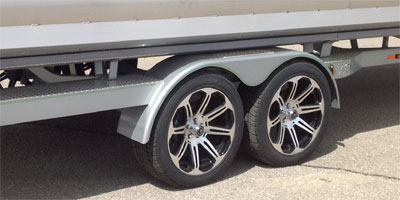 Here’s
something you don’t see
every day. Low profile tires
on a pontoon trailer. Here’s
something you don’t see
every day. Low profile tires
on a pontoon trailer.(cool aluminum rims) The benefit of low profile tires is they corner better on your Porsche or BMW. I have no idea what benefit you’d derive from them on a pontoon trailer. They do ride rougher, and hitting a chuck hole can damage a rim very easily. |
|||||
| HOME | |||||
| PONTOON TRAILERS 101 - FOR EVERYTHING YOU NEED TO KNOW ABOUT PONTOON BOAT TRAILERS | |||||
